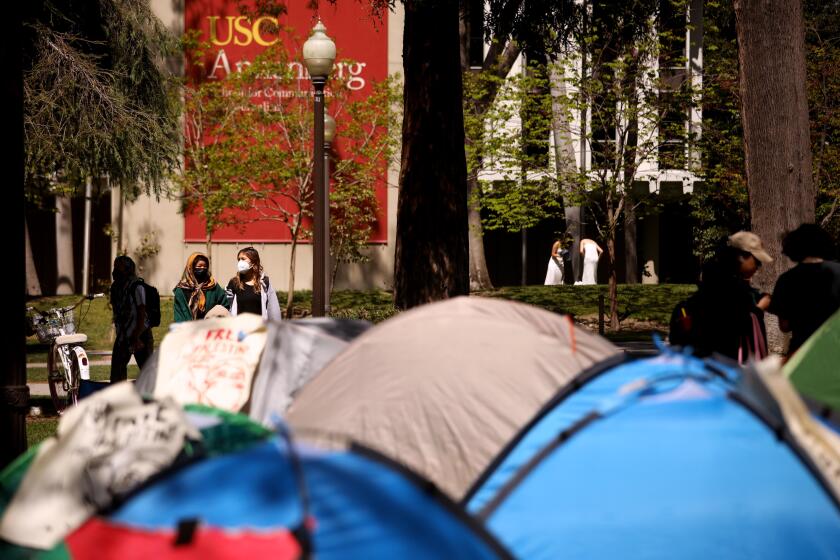Bell is on brink of a fiscal crisis, state audit says
Bell’s finances have worsened considerably since its infamous corruption scandal, leaving the city unable to refund millions of dollars in taxes illegally levied on residents and businesses, an audit released Wednesday shows.
The report by the state controller paints a troubling picture of the small southeast Los Angeles County city’s efforts to recover from the 2010 scandal, which resulted in felony convictions against five former City Council members. The city’s longtime city manager, Robert Rizzo, faces trial on corruption charges later this year.
Bell is now showing a possible negative balance in the city’s general fund of $1.1 million, the auditors found, and has seen a significant drop in revenue after it stopped collecting the illicit taxes. The city could also be on the hook for $4 million in legal costs for the court cases stemming from the scandal.
“The city is facing significant fiscal challenges that, if left unresolved, could lead to a fiscal crisis,” the report says.
Bell still owes more than $3 million in refunds to property and business owners, including more than $800,000 that the city overcharged residents for sanitation services. City leaders told the controller’s office it didn’t have the money to make refunds.
Although Bell has made some reforms, including repaying residents $3 million for illegal property tax collections, the controller found that more action is required. Auditors noted that “current accounting records, general ledger and balances are inaccurate” for a number of reasons, including an “outdated electronic accounting system.”
“Many of the same fiscal management and internal control lapses that allowed Bell to fail its citizens in the past remain unaddressed today,” Controller John Chiang said.
Bell officials took issue with some of the findings. City Manager Doug Willmore said he worried the critical report “makes it even more challenging to rebuild and regain trust from residents.”
Willmore acknowledged the city’s finances remain rocky but said the situation is not as dire as auditors say.
“I think it’s a premature conclusion they made,” Willmore said. “I think at the end of the year, you’ll see the city dramatically different. The financial state will brighten.... We inherited a financial mess, and we’ve done a lot of work, and there’s still a lot of work to do.”
The Bell scandal broke after The Times revealed Rizzo’s outsized salary of nearly $800,000, which experts said almost certainly dwarfed that of any other municipal administrator in the country. Rizzo’s salary financed a lifestyle that included thoroughbred horses. He owned a gelding named Dependserdel’argent -- French for “spend money.” Many of the city’s other administrators also drew hefty salaries.
In March, a Los Angeles jury convicted five of six former council members for misappropriating public funds by exceeding pay limits established by state law and the city’s own charter. The prosecution argued that the six defendants overpaid themselves by sitting on city boards and authorities that did little work.
Bell is one of the latest cities to see its finances crumble amid corruption scandals.
A decade ago, South Gate faced possible insolvency after a similar scandal led to criminal charges against a top official and the recall of council members.
South Gate hired Gary Milliman as city manager to try to rebuild the city’s finances. At one point, South Gate’s deficit was $20 million.
The city pleaded with vendors to reorganize payment plans, laid off workers, cut services and sued law firms and contractors who got “sweetheart deals” from the old regime. For a time, the city seriously considered filing for bankruptcy protection, Milliman said.
“I had many sleepless nights, and it required every bit of my energy and thought process,” said Milliman, now the city manager in Brookings, Ore. “Kind of like managing a disaster event that lasted for three years. It almost cost me my health and marriage.”
He said it was almost four years before South Gate seemed to be on solid ground. Milliman said negative state reports such as the one just released on Bell present another hurdle because it can lower confidence among bond underwriters, lenders and even voters who may need to be persuaded to help financially.
South Gate voters approved new city fees to help close the budget gap.
But that’s not a serious option in Bell because of deep public distrust over the illegal taxes imposed during the Rizzo era. (The state found the taxes were improper because they were imposed without voter approval, as required by law.)
“The residents here have too high of a tax burden, and we actually need to do the opposite,” Willmore said.
The audit notes that Bell didn’t implement more than 20 recommendations made by the controller in 2010 after the scandal broke.
“We prioritized them based on what’s more important for the city, and that’s the context behind all the other actions we’re taking,” Willmore said.
For example, the city chose to focus on a $38-million bond debt, which was more than twice the size of Bell’s nearly $14-million annual operating budget. The bond proceeds were used to buy land near the 710 Freeway.
The city ended up defaulting on the bonds and owing $13 million.
Dexia Credit Local, an arm of a European bank, recently wrote off the debt after long negotiations with the city.
“I’m sorry, but that’s more important than any recommendation the state controller gave,” Willmore said.
Mayor Ali Saleh said he also disagreed with the report, calling it a “small snapshot of our finances” and “not the whole picture.”
“I’m hopeful,” he said. “I know we will address all these issues.”
--
hector.becerra@latimes.com
More to Read
Start your day right
Sign up for Essential California for news, features and recommendations from the L.A. Times and beyond in your inbox six days a week.
You may occasionally receive promotional content from the Los Angeles Times.







